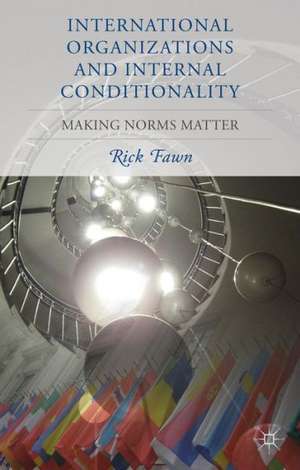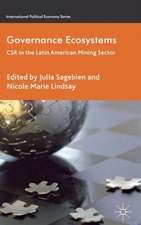International Organizations and Internal Conditionality: Making Norms Matter
Autor R. Fawnen Limba Engleză Hardback – 14 noi 2013
| Toate formatele și edițiile | Preț | Express |
|---|---|---|
| Paperback (1) | 641.38 lei 6-8 săpt. | |
| Palgrave Macmillan UK – 2013 | 641.38 lei 6-8 săpt. | |
| Hardback (1) | 647.40 lei 6-8 săpt. | |
| Palgrave Macmillan UK – 14 noi 2013 | 647.40 lei 6-8 săpt. |
Preț: 647.40 lei
Preț vechi: 761.65 lei
-15% Nou
Puncte Express: 971
Preț estimativ în valută:
123.88€ • 129.69$ • 102.50£
123.88€ • 129.69$ • 102.50£
Carte tipărită la comandă
Livrare economică 05-19 aprilie
Preluare comenzi: 021 569.72.76
Specificații
ISBN-13: 9781137305480
ISBN-10: 1137305487
Pagini: 335
Ilustrații: XIII, 335 p.
Dimensiuni: 140 x 216 x 28 mm
Greutate: 0.61 kg
Ediția:2013
Editura: Palgrave Macmillan UK
Colecția Palgrave Macmillan
Locul publicării:London, United Kingdom
ISBN-10: 1137305487
Pagini: 335
Ilustrații: XIII, 335 p.
Dimensiuni: 140 x 216 x 28 mm
Greutate: 0.61 kg
Ediția:2013
Editura: Palgrave Macmillan UK
Colecția Palgrave Macmillan
Locul publicării:London, United Kingdom
Cuprins
1. International Organizations, Internal Conditionality 2. The Birth of Internal Conditionality: The Conception and Evolution of the Council of Europe and the Organization for Security and Cooperation in Europe 3. International Election Observation Missions: The Deepest Objections and Greatest Resilience of Internal Conditionality? 4. The Council of Europe and the Abolition of the Death Penalty: From External to Internal Conditionality and the Success of Norms over Interests 5. Success in the Toughest of Cases: The Normative Surprise over Chechnya from Internal Conditionality 6. Tajikistan and the OSCE: The Subtlest Victory of Internal Conditionality 7: The Kazakhstani Chairmanship of the OSCE: Internal Conditionality and the Risks of Political Appeasement 8. Making Norms Matter
Recenzii
“Rick Fawn has chosen for this book an interesting point of view which complements greatly the vast literature on international conditionality…. All in all, this is a very interesting study that Fawn offers on a less known aspect of conditionality, namely internal conditionality, contrary to most IR studies which focus on external conditionality.” (Elsa Tulmets, European Review of International Studies, Vol. 4, 2017)
“International Organizations and Internal Conditionality: Making Norms Matter by Rick Fawn is a well researched and informative book on international organizations … . The book is appealing and keeps the reader hooked with liberal quotes, excerpts from reports and interviews. ... This book is an informative read for all scholars and policy makers, and a ‘must read’ for scholars with a special focus on international organisations, Europe and post-Soviet studies.” (Priyanka Chhetri, Political Studies Review, Vol. 14 (1), February, 2016)
“Fawn, in this useful book, speaks about ‘Internal Conditionality’ as a concept that adds a new element for the study of interaction among international organisations (IOs) and member states. … this book will remain a path-breaking investigation in the analysis of international and domestic interactions. In particular it succeeds in bringing new data and concepts to address the latest topics in democratisation studies … .” (Samuele Dominioni, Europe-Asia Studies, Vol. 67 (8), October, 2015)
“Fawn’s book offers insights into the ways in which two understudied organizations function in practice. The book reminds us that norm diffusion can and does continue to occur within organizations even in the face of recalcitrant states…. Fawn’s conceptualization of internal conditionality indicates that all member states should be subject to the same accountability , whether they are “well-behaved” or not.” (Heidi Hardt, Journal of International Organizations Studies, Vol. 6 (1), 2015)
“Rick Fawn… has written an important book. His expertise in security and democratization processes in Central and Eastern Europe is demonstrated on each and every page. He started his academic studies as a student of history, and this shows as well. The book evidences a sound comprehension of the historical context in which these organizations operate, and there is plenty of attention to what other scholars of international law and international relations might view as minor details.” (Otto Spijkers, Security and Human Rights, Vol. 25 (4), 2014)
“International Organizations and Internal Conditionality: Making Norms Matter by Rick Fawn is a well researched and informative book on international organizations … . The book is appealing and keeps the reader hooked with liberal quotes, excerpts from reports and interviews. ... This book is an informative read for all scholars and policy makers, and a ‘must read’ for scholars with a special focus on international organisations, Europe and post-Soviet studies.” (Priyanka Chhetri, Political Studies Review, Vol. 14 (1), February, 2016)
“Fawn, in this useful book, speaks about ‘Internal Conditionality’ as a concept that adds a new element for the study of interaction among international organisations (IOs) and member states. … this book will remain a path-breaking investigation in the analysis of international and domestic interactions. In particular it succeeds in bringing new data and concepts to address the latest topics in democratisation studies … .” (Samuele Dominioni, Europe-Asia Studies, Vol. 67 (8), October, 2015)
“Fawn’s book offers insights into the ways in which two understudied organizations function in practice. The book reminds us that norm diffusion can and does continue to occur within organizations even in the face of recalcitrant states…. Fawn’s conceptualization of internal conditionality indicates that all member states should be subject to the same accountability , whether they are “well-behaved” or not.” (Heidi Hardt, Journal of International Organizations Studies, Vol. 6 (1), 2015)
“Rick Fawn… has written an important book. His expertise in security and democratization processes in Central and Eastern Europe is demonstrated on each and every page. He started his academic studies as a student of history, and this shows as well. The book evidences a sound comprehension of the historical context in which these organizations operate, and there is plenty of attention to what other scholars of international law and international relations might view as minor details.” (Otto Spijkers, Security and Human Rights, Vol. 25 (4), 2014)
Notă biografică
Rick Fawn is a Senior Lecturer in the School of International Relations at the University of St Andrews, UK. He has recently edited Georgia: War and Revolution and Globalising the Regional, Regionalising the Global and is co-author of Historical Dictionary of the Czech State.

















